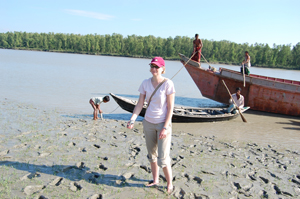Local woman works as USAID diplomat
While many locals spent the holidays at home with family, one
Hollister woman was halfway around the world in a disaster
zone.
Local woman works as USAID diplomat
While many locals spent the holidays at home with family, one Hollister woman was halfway around the world in a disaster zone.
When a tropical cyclone, Sidr, hit southern Bangladesh Nov. 15 with winds up to 155 miles an hour, many people were hurt.
As many as 3,347 people were killed with 871 people still missing, according to the Government of Bangladesh. 1.5 million houses were damaged or destroyed.
Two days later when the U.S. Agency for International Development sent workers to help, Adriana Barel was with them.
Barel grew up in Hollister and graduated in 1994. Her parents still call the city home. Barel is posted for a two-year stint in Dhaka, Bangladesh as a foreign service officer.
“A few days after the cyclone hit I headed out with some of my Bangladeshi colleagues…to assess how the U.S. government could best meet the needs of people who had lost their homes, possessions, crops and jobs,” Barel wrote in an e-mail. “After talking with people who had nothing but the clothes they were wearing and a few scraps of their homes that they had salvaged from the debris, I had a renewed sense of thankfulness for our Thanksgiving dinner of lentils, fish, lamb and rice from a local restaurant.”
After assessing the damage, USAID staff sent more than $19.5 million in assistance. About $15 million went to emergency food assistance, with help from the Red Cross for distribution.
Barel’s birthday came and went while she was in Southern Bangladesh, though her friends threw her a belated celebration when she returned to Dhaka.
“The best birthday ‘gift’ I received was being able to visit remote villages by fishing boat and hear[ing] that families had received emergency food through USAID,” Barel wrote, “And know[ing] that USAID and the U.S. military were working to give more food, provide emergency shelter materials and deliver relief supplies to isolated villages.”
USAID was founded as part of the Marshall Plan in 1961 after World War II. The purpose of the agency is to assist countries during recovery from disaster, or while they try to development economically and take on democratic reforms. The agency is independent, but receives input from the Secretary of State. The budget for the agency is less than .5 percent of the overall federal budget.
There are several reasons USAID has people such as Barel settled in Bangladesh. In addition to disaster relief, there are several programs set up to help the residents. The country is densely populated and poor. The average annual income per person is $470.
One project includes education about sexually transmitted disease and pregnancy. South Asia has a growing rate of HIV/AIDS infection, and it is expected that 40 million people will be infected in the region by 2010.
The program staff reached 2 million people in Bangladesh in 2006 with prevention methods, treatment for sexually-transmitted diseases and counseling, according to USAID staff. The program also works to increase general education since in rural villages enrollment in primary schools can be as low as 20 percent.
In addition, staff are working on ways to help with economic growth in populations that are poor or at-risk, including women and youth. One project includes bringing electricity to rural areas since availability of the resource increases economic opportunities. In 2006, 7 million homes were connected to electricity.
While other projects are also in the works to increase democracy and security in the country, disaster relief is a big part of USAID’s mission. The country suffers from a major disaster every six years, and the cyclone was the most recent tragedy.
“Since Thanksgiving, it has been fulfilling to see how the generosity and hard work of the United States, other countries and countless organizations, individuals and the national government have met the challenge of addressing the immediate needs from the humanitarian emergency,” Barel wrote. “Looking ahead beyond Christmas, I know that much more time and resources will be needed to help Bangladeshis repair and rebuild…”










